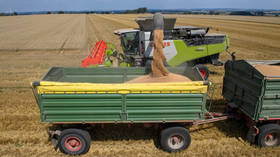West’s Russia sanctions forcing UN food agency to pay more – official
The World Food Programme has also been delaying payments for provisions already supplied, an official at the agency has said
Westerns sanctions against Russia are forcing the UN World Food Programme (WFP) to buy food at significantly higher prices, according to Moscow’s deputy permanent representative to the organization, Dilyara Ravilova-Borovik.
Speaking to RIA Novosti, Ravilova-Borovik said the restrictions against Russia have forced the WFP, a humanitarian organization which is focused on providing food to poor nations, to make purchases from other countries, in some cases paying “two or more times more.”
“With a budget deficit of more than 60%, it is clear that such wastefulness is undermining the programme’s ability to reach all those in need of food. The WFP’s latest reports demonstrate reductions in daily food rations, as well as the decline in the number of food aid recipients, across the countries that are most in need,” said Ravilova-Borovik.
The official emphasized that Russian suppliers continue to face problems accessing food tenders issued by the WFP due to Ukraine-related sanctions. The organization is also delaying payments owed to Russian companies for already supplied provisions, she added.
“Problems with the participation of Russian suppliers in the programme’s tenders continue. Under the conditions of sanctions, the WFP Secretariat does not meet the deadlines for reimbursement of expenses to Russian companies for food that was already supplied,” she said.
Ravilova-Borovik explained that the challenges are related to the fact that settlements are carried out in US dollars and go through US-based banks, where payments become subject to additional and lengthy verification.
In June, Ravilova-Borovik told the RBK business news outlet that Russian companies were restricted from accessing tenders for food supplies for the WFP. “A number of donors, when transferring funds to the WFP, had issued a warning that they cannot be used to purchase food made in Russia or purchased from Russian companies,” she said at the time.
You can share this story on social media:








Comments are closed.